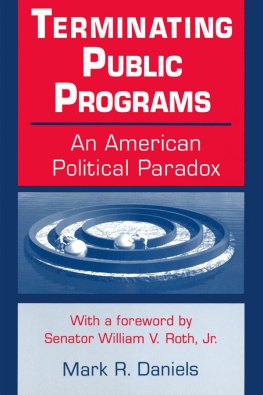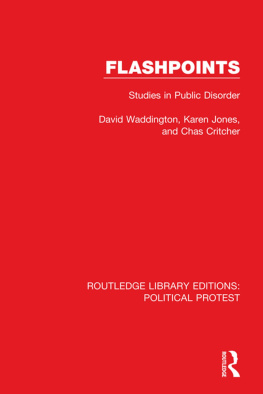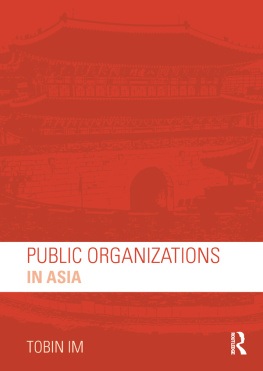TERMINATING
PUBLIC
PROGRAMS
TERMINATING
PUBLIC
PROGRAMS
An American Political Paradox
With a foreword by
Senator William V. Roth, Jr.
Mark R. Daniels
First published 1997 by M.E. Sharpe
Published 2015 by Routledge
2 Park Square, Milton Park, Abingdon, Oxon OX14 4RN
711 Third Avenue, New York, NY 1001, USA
Routledge is an imprint of the Taylor & Francis Group, an informa business
Copyright 1997 Taylor & Francis. All rights reserved.
No part of this book may be reprinted or reproduced or utilised in any form or by any electronic, mechanical, or other means, now known or hereafter invented, including photocopying and recording, or in any information storage or retrieval system, without permission in writing from the publishers.
Notices
No responsibility is assumed by the publisher for any injury and/or damage to persons or property as a matter of products liability, negligence or otherwise, or from any use of operation of any methods, products, instructions or ideas contained in the material herein.
Practitioners and researchers must always rely on their own experience and knowledge in evaluating and using any information, methods, compounds, or experiments described herein. In using such information or methods they should be mindful of their own safety and the safety of others, including parties for whom they have a professional responsibility.
Product or corporate names may be trademarks or registered trademarks, and are used only for identification and explanation without intent to infringe.
Library of Congress Cataloging-in-Publication Data
Daniels, Mark Ross, 1952
Terminating public programs : an American political paradox / by Mark R. Daniels
p. cm.
Includes bibliographical references and index.
ISBN 0-7656-0124-9 (cloth: alk. paper).ISBN 0-7656-0125-7 (pbk. : alk. paper)
1. Political planningUnited StatesEvaluation.
2. Policy sciencesEvaluation.
3. Public administrationUnited StatesEvaluation.
4. Sunset reviews of government programsUnited States. I. Title.
| JK468.P64D36 | 1997 |
| 320.60973dc21 | 9710553 |
| CIP |
ISBN 13: 9780765601254 (pbk)
ISBN 13: 9780765601247 (hbk)
To Dr. Patrick J. Fett
Contents
by Senator William V. Roth, Jr.
Tables and Figures
Figures
Tables
Thirty years ago, as a freshman Congressman, I undertook a project to examine the size and scope of the Federal government. A committed proponent of balanced budgets, tax cuts, and a limited bureaucracy, my objective was to compile a list of all the federally operated programs providing assistance to the American public.
Little did I know how massive and challenging that project would be. As my staff and I made countless telephone calls, searched government manuals, Federal Registers, and Congressional Records, as we wrote letter after letter, and even searched the government-listings pages of public telephone books, we discovered two things: first, that it would be impossible to know exactly how many Federal programs are in existence; and, second, that forces within the government itself did not want such a list compiled.
As I said the day I introduced the Roth Study on the floor of Congress, my staff and I found that the Federal government itself did not possess enough information on all its programs to allow our studywhich took eight dedicated monthsto assemble a comprehensive list. We found that there was not enough information for the Federal government to make even reasonable comparisons of one program with another, or to prevent costly and inefficient duplications.
We found many instances where cabinet departments and agencies had programs devoted to the same general activitiesand that there was no way to cross-reference them, no way to compare the programs side-by-side in a meaningful manner that would allow us to examine them, to cut away those programs that were needless and streamline those that were useful and productive.
Again, this was thirty years ago. The Federal budget was $178 billion. Today total annual outlays are over $1.6 trillion. The government has mushroomed, despite repeated attempts to staunch its rate of growth or even to cut it back.
In the 1980s, Ronald Reagan appointed Peter Grace to chair his Private Sector Survey on Cost Control. Findings by the Grace Commission suggested that the conditions we had discovered over a decade earlier had become exacerbated. After trying to find out how many government programs exist, Peter Grace discovered that no one had the answer. There is just no central source for that kind of information, which would be immediately available to any private-sector executive. Like us, Grace found that the Federal government doesnt know how many offices it has or where theyre located. The commissions best guess was that there were over 963 federal social programs alone.
One of the reasons for this explosion in government is the phenomenon that Professor Mark Daniels examines in Terminating Public Programs. Once created, a government organization is virtually immortal. And when the rare organization is terminated, its functions are usually transferred to another organization. In other words, while the government continues to growcreating policies, roles, functions, and organizations to meet current and genuine needsold policies, roles, functions, and organizations are not terminated, despite the fact that they, as most often is the case, are no longer necessary.
I realized just how absurd this condition had become when, as Chairman of the Senate Governmental Affairs Committee, I sponsored the legislation that created the bipartisan Military Base Closure Committee. Until that time, there had been no mechanism to effectively close military bases, despite how obsolete they had become, and the results were almost comedic. The purpose of one active base we looked at had been to serve as an outpost for the Pony Express. Another base in the South was actually protected by a moat. But as with any government program, these bases had their constituencies, their local communities that depended on them for economic reasons, and their Representatives and Senators to protect them in Washington, D.C.
The Military Base Closure Committee is one example of how innovative ideas can produce successful results. I am honored that this bipartisan effort is included in Professor Danielss examples of programs that have worked. But I am troubled that his list of successful terminations is so short. It means that there are countless other public programs, policies, and organizations that are no longer vital to the well-being of America, or that do not contribute in the manner for which they were originally intended. Yet they continue to exist because of inertia, because of protectionist measures by their patrons in Congress and the Executive Branch, or, as Professor Daniels demonstrates, due to their sheer bureaucratic strength.
Beyond the Military Base Closure success, there have been a few other important steps in the effort to make the Federal bureaucracy more efficient and cost-effective. For example, in 1993, Congress passed the Government Performance and Results Act, which requires Federal agencies to develop five-year strategic plans with measurable long-term goals. The law also requires annual performance plans and reports on whether or not those plans are achieved. GPRA was a critical step toward establishing performance-based management and assessing the mission, value, and success of Federal agencies.
Next page







